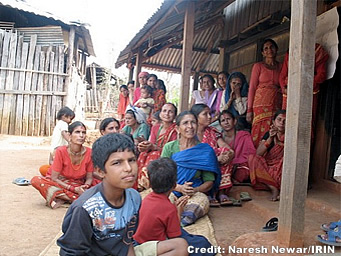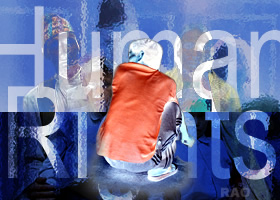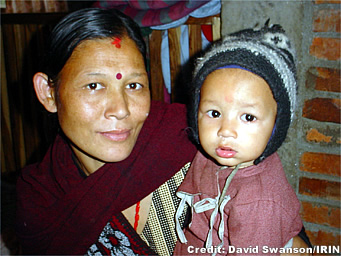|
Nepal
in Crisis 2006: Human Rights
|
|
Conflict
areas benefit from ceasefire
|
 |
BENIMANIPUR,
11 May 2006 (IRIN)
Working
directly with the community, Khim Bahadur Rana walks five hours every day
visiting poor households to educate illiterate Nepalese women and girls
on the importance of childcare and nutrition in the remote village of Benimanipur,
280 km west of the capital Kathmandu.
 |
| <<
Villagers in Benimanipur are estatic - the bilateral ceasefire means they
no longer live in fear
The
job is difficult, if not dangerous, in the village, which like most rural
areas of Nepal has been seriously affected by the decade-long conflict
between the Nepalese government and the Maoist insurgents.
But
that may change following an announcement by the Maoist rebels on 4 May
that they were ready for peace talks with the new government - which was
formed by the seven main political parties after Nepalese monarch King
Gyanendra gave up absolute rule on 24 April following nationwide mass protests
against him. |
|
 |
|
With
the new government in place, both sides have declared an indefinite ceasefire.
|
 |
These
positive political developments have brought relief to Nepalese villagers
who had been living for years in fear, and had suffered violence at the
hands of both the security forces and rebel militants. They are now awaiting
the dividends of peace.
 |
|
| "I
can now do my community work without any fear. I no longer worry about
returning home safely," said Rana, who hopes that the conflict, which has
already cost over 13,000 lives and displaced over 100,000 Nepalese villagers
from their homes, is now in the process of heading towards a peaceful political
resolution.
"We
should lose no time in resuming our rural development activities," said
Rajendra Debkota, a local government worker at the Benimanipur Village
Development Committee (VDC) office, explaining that many projects had been
impossible to implement during the conflict. |
|
"I
can now do my community work without any fear. I no longer worry about
returning home safely," said Rana, who hopes that the conflict, which has
already cost over 13,000 lives and displaced over 100,000 Nepalese villagers
from their homes, is now in the process of heading towards a peaceful political
resolution.
 < < |
| "The
peaceful situation has allowed the poor villagers, especially the women,
to organise groups to raise funds for their community development work,"
said Yam Kumari Rana, a female community worker, who added that villagers
were now returning home after many years to be with their families.
In
addition, internally displaced families who had been living in major towns
and cities in generally impoverished conditions were also starting to head
back to their villages after the Maoist rebels made their announcement,
coupled with a pledge to return all properties seized by them earlier. |
|
Both
the government and the rebels have expressed hope that the political crisis
could now be resolved, with the former already conceding to Maoist demands
for an interim government, constituent assembly and the eventual establishment
of a democratic republic.
The
rebels in turn have also agreed to join mainstream politics in a peaceful
manner.
"There
are clear signs that the new government is sincere about a new political
resolution. The truce will not be broken on our part unless there is betrayal
from the parties," said Maoist leader Akash, who added that talks with
the government would soon take place.
But
villagers remain concerned over Maoists still collecting money from each
household to fund their rebellion. "This is extortion and not a voluntary
contribution as the rebels claim," said one shopkeeper, requesting not
to be named. He claimed that the extortion in both rural and urban areas
was continuing, despite calls by the seven main political parties to the
Maoist leadership to stop it.
Still
another major concern among citizens' groups and human rights activists
is that the Royal Nepalese Army (RNA) remains loyal to the king, who is
also the supreme commander of the armed forces.
The
rebels have said that the RNA will be a key issue during upcoming talks
and have demanded that a new national army be set up to include both the
RNA and the People's Liberation Army (PLA-Maoists). The parties and rebels
both fear that today's fragile peace will not last as long as the RNA is
not independent from the king and his palace secretariat.
Credit
IRIN 2006
Copyright
© UN Office for the Coordination of Humanitarian Affairs 2006
[
This report does not necessarily reflect the views of the United Nations]
Integrated
Regional Information Networks (IRIN), part of the UN Office for the Coordination
of Humanitarian Affairs (OCHA).

|





 <
<
